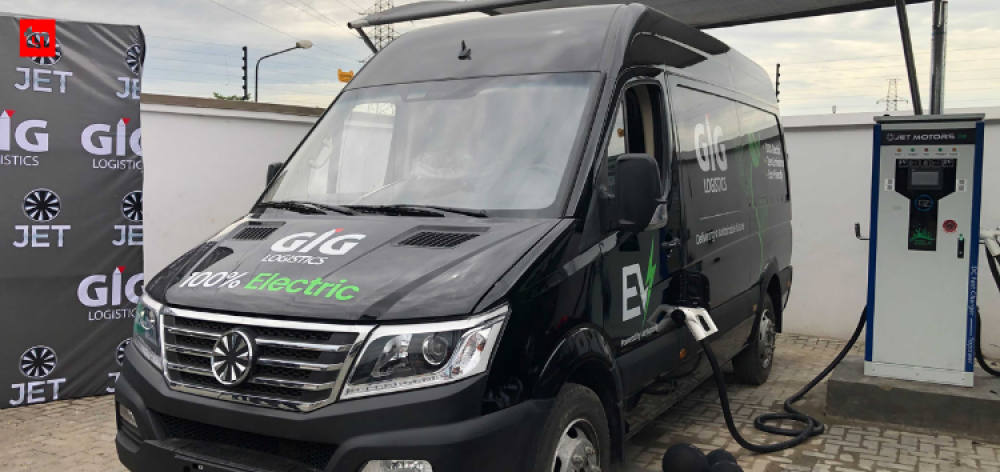
GIGL And Nigeria JET Motor Company Have Partnered To Launch The First Electric Cargo Vans In NIgeria
GIGL and Nigeria's JET Motor Company have partnered to launch the country's first electric cargo vans
GIG Logistics (GIGL), a Nigerian logistics conglomerate, recently added four all-electric cargo vans to its Lagos fleet in collaboration with indigenous automaker JET Motor Company (JET).
GIGL Director of Operations, Ocholi Etu, revealed during a press conference held last Friday at GIGL's Lagos digital hub that the partnership "began about two years ago, when we approached JET to provide us with a fleet of all-electric cargo vans for last-mile delivery across Nigeria."
JET announced a $9 million fundraising campaign in 2020, roughly 15 months earlier, to fund research and development into building the 'Tesla of Africa.' Prior to that, the nearly four-year-old automaker had established a respectable customer base for its petrol-powered JET Mover line.
However, the company's Director of Sales and Marketing, Rupani Sanjay, stated at the time that the end goal was to develop Africa-centric electric vehicles (EVs), which prompted the capital raise (which was completed in 2019). Originally, the ‘JET EV' cargo line was scheduled to launch in Q3 2020. However, plans were delayed by a few months due to the COVID-19 pandemic.
Nigeria is plagued by epileptic power supply and other infrastructural issues, rendering electric vehicles essentially impractical and, some would argue, near-useless in the market.
“That is why we are starting with the four electric vans on an intra-city route,” Joseph Wemimo, JET's Strategy Lead/Chief Financial Officer, clarifies.
Both parties will tread carefully, despite JET's commitment to provide GIGL with at least 46 additional JET EV vans over the next two years.
Meanwhile, they appear to have a good handle on a lot of things. For example, each JET EV van comes equipped with a 107.8 kWh lithium-ion battery that Wemimo claims can travel approximately 240 kilometers on a single charge.
“In fact, they can travel over 300 kilometers on a single charge,” Wemimo notes, “but in our research, we discovered that they can easily travel 240 kilometers.”
Also, the environment-specific features include shock absorbers that are "stronger than average," increased ground clearance, and larger tires, as well as other specifications carried over from the JET Mover line, which, as Sanjay explained to Techpoint Africa last year, is the result of more than three years of research, testing, and iterative development, inspired by a blend of the best design and technology practices from around the world.
“We wanted to create a global product that would stand the test of time. We were obsessed with getting it right because we knew that if our vehicles performed well on Nigerian and African roads, they would perform well anywhere in the world,” Sanjay explained at the time.
Wemimo has the following to say about the effect Lagos' notorious traffic may have on battery life:
“We optimized the batteries so that they discharge at a rate of only 2% while idling. Therefore, even if you spend ten hours in traffic, you can easily cover 240 kilometers with a fully charged battery.”
To put things in perspective, the driving distance between Lagos and Benin is 300 kilometers. To put things in perspective, a fully charged van departing from GIGL's Lagos digital hub in Gbagada — the company's only location with charging stations — traveling to the GIGL outlet along Ilupeju, stopping at GIGL Jibowu before continuing to the GIGL outlet along the Lekki-Ajah expressway, and finally returning to the digital hub, would have covered only about 83 kilometers — roughly one-third of its single-chariot distance.
“The plan is to continue expanding charging stations throughout Lagos, but this is subject to demand,” Wemimo explains.
“Our ultimate goal is for GIGL to be carbon neutral,” Etu continues, “which means that every vehicle we use will be entirely electric. And hopefully, with government support for additional charging stations along expressways such as the Sagamu or Ijebu-Ode, we can expand it beyond Lagos.
“Why do they require government assistance? ” you may inquire. Wemimo clarifies:
“In developed markets such as Norway, where the government intends to phase out petrol and diesel cars entirely by 2025, various incentives — including tax exemptions, cash incentives, and investments — are in place to encourage mass consumer adoption and innovation in the EV space.”
In a similar vein, Sanjay asserts that at full capacity, JET's Lagos assembly plant can produce five to seven vehicles per day — or approximately 5,000 per year — on demand.
“However, it is irrelevant how many units we can produce daily if there is insufficient demand, stimulated by government policies.”
To be precise, even in South Africa, Africa's most developed EV market, only 1,000 of the 12 million vehicles on the road are said to be electric. Likewise, Cape Verde appears to be the only African country actively considering (PDF) the phase-out of electric vehicles in the near future. In comparison, Asia, Europe, and the Americas all have at least 17 countries with similar policies.
Nonetheless, GIGL and JET are proceeding cautiously.
“We cannot afford to wait for infrastructure and policy to improve. We are outpacing the country, and hopefully the country will catch up,” Etu observes.
In Conclusion
GIGL hopes to convert more than 60% to 70% of its fleet to fully electric vehicles within the next five to seven years. Additionally, JET is contractually obligated to provide GIGL with a year of complimentary after-sales support and training for internal technicians to assist with the transition.
Meanwhile, Sanjay emphasizes the fact that JET is open to collaborating with additional brands and organizations in addition to GIGL.
“While our EV segment is currently focused on the cargo version for intra-city logistics, we are open to collaborating with anyone in Lagos and throughout Nigeria, including private tour operators, medical services, schools, government, and even the military.”
Courses and Certification
Basic Electronics Course and Certificate
Basic Electricals Course and Certificate
Electrical Safety Course and Certificate

